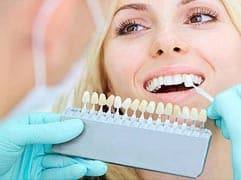What is Tooth Decay?
Tooth decay, which can also be called dental caries or cavities, is a breakdown of the teeth due from acids produced by bacteria in the mouth. The cavities can be various colors which can range from yellow to gray or black. Symptoms may include pain, sensitivity, odor and sticky spots on the teeth. Complications can include inflammation of the tissue which surround the tooth, infection, abscesses, and loss of the tooth.
Cavities are caused when acid from bacteria breaks down the hard outer tissues of the teeth which includes the enamel, dentin and cementum. The harmful acid is produced by bacteria it breaks down food debris or sugar found on surface of the tooth. When the breakdown of minerals is greater than the build up from sources such as saliva, it results in cavities. Risk factors for cavities include conditions which result in a reduced production of saliva. These conditions include diabetes and Sjögren syndrome, in addition to some medications. Medications which decrease the production of saliva can include antihistamines and antidepressants. Dental caries are also commonly associated with poor oral hygiene and gum disease.
In order to prevent dental caries, it is important to thoroughly clean the teeth with brushing a flossing, maintaining a diet which is low in sugar, and use small amounts of fluoride. It is recommended to brush your teeth twice each day and floss your teeth daily. Fluoride may be acquired from some water sources, toothpaste, and other sources. Early screening can also result in earlier detection and prevention. Depending on the extent of the decay, there are treatments available to restore the teeth to their proper function. In extreme cases of tooth decay, the tooth may be extracted.
Throughout the world, about 3.6 billion people or nearly half of the population have dental caries in their permanent teeth. According to the World Health Organization, almost all adults have had dental caries at some point throughout their life. They are becoming more common in both children and adults. The word caries is Latin for "rottenness".
It is possible that someone can experience dental caries without being aware of the disease. The first stage of tooth decay is the appearance of a chalky white spot on the surface of the tooth. This indicates an area of demineralization of the enamel. As the lesion progresses and continues to demineralize, it can turn brown but eventually turns into a cavity. Prior to the cavity forming, the process is reversible. Once a cavity forms, however, the lost tooth cannot be regenerated. A lesion which appears as dark brown and shiny suggests dental caries were once present but the demineralization process stopped and left a stain. Active decay is lighter in color and duller in appearance.
Once the enamel and dentin have been destroyed, the cavity is usually more noticeable. The areas of the tooth which are affected may change in color and become softer. Once the decay passes through the enamel, the dentinal tubules are exposed. The dentin acts as a passage to the nerve of the tooth and this exposure causes pain. The pain can worsen when the tooth is exposes to heat, cold, or sweets. A tooth which is weakened from extensive internal decay may also unexpectedly fracture during regular use. When the decay has progressed to the extent of bacteria overwhelming the pulp tissue in the center of the tooth, patients may experience a toothache and the pain may be more constant. This can often cause death of the pulp tissue and infection. At this stage, the tooth may not be sensitive to hot or cold, but may be highly sensitive to pressure. When the tooth decay has progressed beyond the possibility of treatment, the tooth must be extracted.
More on Tooth Decay : Stages of Tooth Decay
Actual Patient Reviews
We have so many terrific reviews it's impossible for us to list them all! Thanks for supporting Iowa Dental Group with your gratitude.
Dental Office Location
Iowa Dental Group prides ourselves in offering the highest quality dentistry at a fair and reasonable fee.
Des Moines, Ia 50311
(515) 277-6358
iowadentalgroup@hotmail.com
https://www.iowadentalgroup.com
Iowa Dental Group Contact Form
Our Des Moines' Dentists Bob Margeas DDS & Nicholas Economos are eager to help provide any answers you may have. Contact us today regarding optimal oral health.
Dentist Office Hours
Our Dentists look forward to answering any dentistry related questions or dental concerns you may have regarding your overall oral health and smile.
Office Hours
| Monday: | 7:30am - 5:00pm |
| Tuesday: | 7:30am - 5:00pm |
| Wednesday: | 7:30am - 5:00pm |
| Thursday: | 7:30am - 5:00pm |
| Friday: | Closed |
| Saturday: | Closed |
| Sunday: | Closed |
















